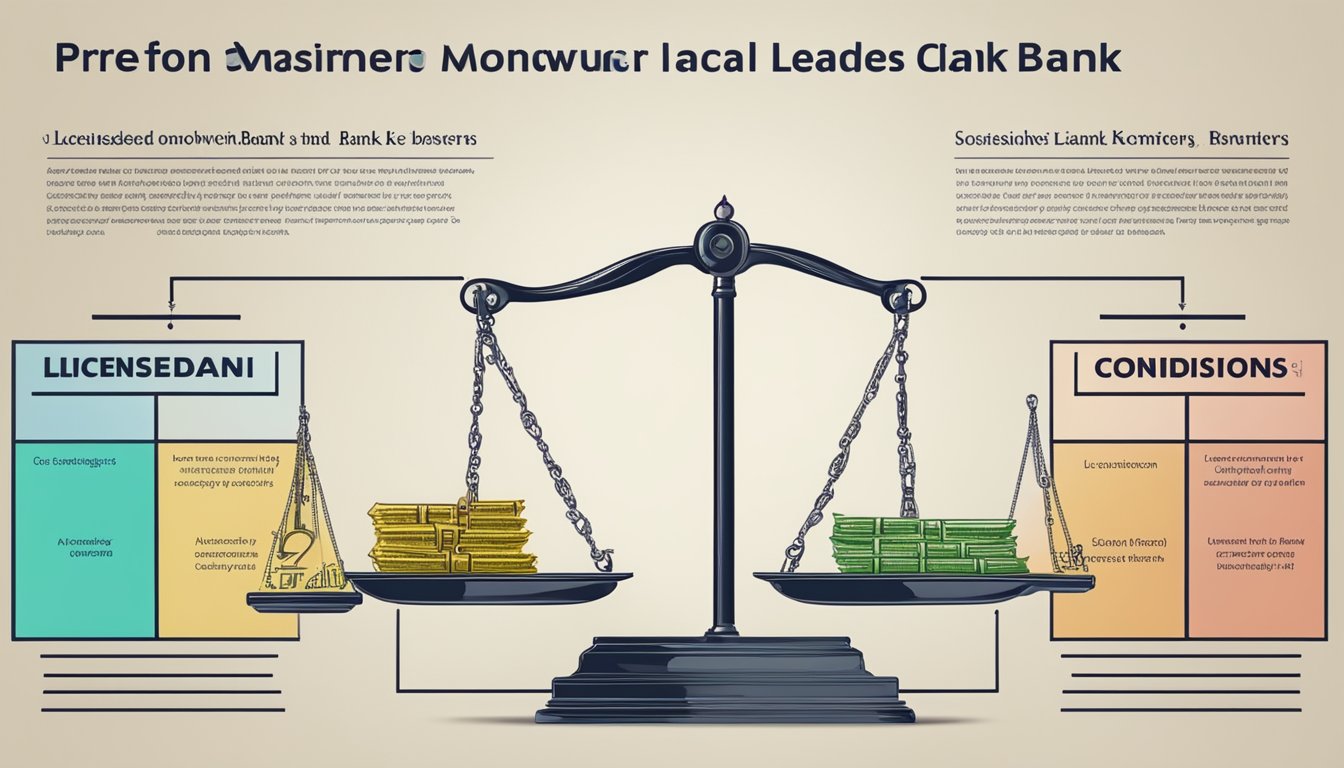Are you considering taking out a personal loan in Singapore? If so, you may wonder whether a licensed money lender or a bank is better. While both types of lenders offer loans, there are key differences in their eligibility criteria that you should be aware of before you apply.

When borrowing from a bank, your credit score is one of the most important factors lenders consider. Banks typically require borrowers to have a good credit score, a stable income, and a low debt-to-income ratio. Additionally, banks may require collateral for larger loans, such as a car or property.
On the other hand, licensed money lenders in Singapore may be more flexible with their eligibility criteria and may not require collateral for smaller loans. However, licensed money lenders typically charge higher interest rates than banks.
Understanding the differences between licensed money lenders and Singapore banks is essential before applying for a personal loan. By doing so, you can ensure that you choose the right lender for your needs and increase your chances of being approved for a loan you can comfortably repay.
1 Minute Read: Licensed Moneylender vs Bank: Borrower’s Eligibility Criteria
Hey there, fellow borrower! Need a quick rundown on the contrasting worlds of licensed moneylenders versus banks in Singapore? Look no further; we’ve covered you with the essential details you need to know.
Let’s dive right into it!
Licensed Moneylenders: Your Trusty Alternative
When it comes to borrowing, licensed moneylenders offer a more accessible route for those seeking financial assistance. Here’s the lowdown on what you need to know:
Eligibility Criteria:
- Age Requirement: You must be at least 21 to borrow from a licensed moneylender in Singapore.
- Income Requirement: While specifics may vary, typically, licensed moneylenders require proof of income. This ensures you have the means to repay the loan.
- Credit History: Unlike banks, licensed moneylenders may be more flexible with credit history. They assess your ability to repay based on your current financial situation rather than solely relying on credit scores.
- Identification: You must provide valid identification documents such as your NRIC or work permit if you’re a foreigner.
- Employment Status: Whether you’re employed, self-employed, or even unemployed, licensed moneylenders may have options tailored to your situation.
While we’ve covered the basics here, a wealth of information is waiting for you to discover below.
Licensed Moneylender vs Bank Borrower Eligibility: Understanding the Basics

If you’re looking for a loan in Singapore, you have two options: licensed money lenders or banks. Both have their pros and cons, and it’s important to understand the basics of each before making a decision.
What Is a Licensed Money Lender?
A licensed money lender is a financial institution that provides short-term loans to individuals. They are licensed by the Ministry of Law and regulated by the Monetary Authority of Singapore. Licensed money lenders typically have a simpler application process than banks and can provide faster loan approvals. However, they often charge higher interest rates than banks, so it’s important to carefully assess the total cost of borrowing before making a decision.
How Banks Operate in Singapore
Banks in Singapore are regulated by the Monetary Authority of Singapore and offer a variety of financial services, including loans. Banks often provide lower interest rates than licensed money lenders, especially for those with good credit scores. However, banks may have more stringent eligibility criteria and a longer application process than licensed money lenders.
When applying for a loan, it’s important to consider your eligibility criteria and the terms and conditions of the loan. Some factors to consider include your credit score, income, and loan amount. By understanding the basics of licensed money lenders and banks in Singapore, you can make an informed decision about which option is best for you.
Licensed Moneylender vs Bank Borrower Eligibility: The Criteria for Borrowers

If you’re looking for a personal loan in Singapore, you’ll need to meet certain eligibility criteria to qualify for a loan from either a licensed money lender or a bank. Here are the requirements you’ll need to meet for both options:
Licensed Money Lenders’ Requirements
To be eligible for a personal loan from a licensed money lender in Singapore, you must be:
- At least 18 years old
- A Singaporean citizen, permanent resident, or a foreigner with a valid employment pass
- Able to provide proof of income, such as payslips or income tax statements
- Able to provide your NRIC card or passport for identification purposes
Licensed money lenders typically have more flexible eligibility criteria than banks, which means that borrowers with lower credit scores or annual income may still be eligible for a loan. However, the loan amount you can receive from a licensed money lender is typically smaller than what you can receive from a bank.
Banks’ Requirements
To be eligible for a personal loan from a bank in Singapore, you must be:
- At least 21 years old
- A Singaporean citizen or permanent resident
- Able to provide proof of income, such as payslips or income tax statements
- Meet the minimum annual income requirement, which varies depending on the bank
Banks typically have stricter eligibility criteria than licensed money lenders, which means that borrowers with lower credit scores or annual income may have a harder time qualifying for a loan. However, banks offer higher loan amounts than licensed money lenders, which can be beneficial for borrowers who need a larger loan.
Overall, both licensed money lenders and banks have their own unique eligibility criteria that borrowers must meet in order to qualify for a personal loan in Singapore. Be sure to review the requirements carefully and choose the option that best fits your financial needs.
Licensed Moneylender vs Bank Borrower Eligibility: Loan Application and Approval

When it comes to applying for a loan, there are some differences between licensed money lenders and banks in Singapore. Here’s what you need to know about the loan application and approval process for each.
Process with Licensed Money Lenders
Licensed money lenders in Singapore typically have a simpler loan application process than banks. They require less documentation and may not conduct as thorough a credit check as banks. However, you still need to provide proof of income and may need to submit your credit report from Credit Bureau Singapore.
The loan application process with licensed money lenders is usually faster than with banks. You can often get approved for a loan within a few hours or days. However, keep in mind that licensed money lenders may charge higher interest rates than banks.
Process with Banks
Banks in Singapore have a more stringent loan application process than licensed money lenders. They require more documentation, such as proof of income and employment, and conduct a thorough credit check. You’ll also need to submit your credit report from Credit Bureau Singapore.
The loan approval process with banks can take several weeks or even longer. However, banks often offer lower interest rates than licensed money lenders, especially if you have a good credit score.
Overall, the loan application and approval process with licensed money lenders is generally faster and simpler than with banks. However, banks may offer lower interest rates and more favourable terms if you have a good credit score. It’s important to shop around and compare your options before deciding on a lender.
Tip: Building A Strong Credit Profile
Timely bill payments, maintaining a low credit utilisation ratio, and minimising credit inquiries can significantly boost your credit score. This enhances your chances of approval and opens doors to better interest rates and terms from both banks and licensed money lenders.
Remember, a little effort in improving your creditworthiness today can lead to significant savings in the long run.
Licensed Moneylender vs Bank Borrower Eligibility: Financial Products Offered

When it comes to financial products offered, both licensed money lenders and banks in Singapore offer a variety of options to suit your needs.
Variety by Licensed Money Lenders
Licensed money lenders in Singapore offer a range of loan products, including personal loans, secured loans, unsecured loans, and business loans. These loans can be used for a variety of purposes, such as paying off credit card debt, financing a car, or starting a business.
One of the advantages of borrowing from a licensed money lender is that they often have more lenient eligibility criteria than banks. This means that even if you have a low credit score or a history of late payments, you may still be eligible for a loan. Additionally, licensed money lenders can often approve loans faster than banks, which can be helpful if you need cash urgently.
Bank Financial Products
Banks in Singapore offer a wide range of financial products, including personal loans, credit cards, mortgages, car loans, and business loans. These products often come with lower interest rates than licensed money lenders, making them a good option if you have a good credit score and can meet the eligibility criteria.
One of the advantages of borrowing from a bank is that they often offer more flexible repayment terms than licensed money lenders. For example, you may be able to choose between a fixed or variable interest rate, or you may be able to choose a longer repayment period to lower your monthly instalments.
Overall, both licensed money lenders and banks in Singapore offer a variety of financial products to suit your needs. It’s important to compare the eligibility criteria, interest rates, and repayment terms of each option to find the best fit for you.
Licensed Moneylender vs Bank Borrower Eligibility: Interest Rates and Fees

When it comes to borrowing money, one of the most important factors to consider is the interest rate. This is the amount of money you will be charged for borrowing the funds. Banks often provide lower interest rates, especially for those with good credit scores. On the other hand, licensed money lenders typically charge higher interest rates than banks. However, licensed money lenders may have lower interest rates than credit card interest rates to account for the increased risk associated with lending to borrowers with lower credit scores or unique financial circumstances.
Comparing Interest Rates
It’s important to compare interest rates from different lenders to ensure you’re getting a competitive rate. Banks often have a set interest rate for personal loans, which can be lower than the maximum interest rate set by the government. Licensed money lenders, on the other hand, may charge interest rates that are close to the maximum allowed by the government. It’s important to note that the maximum interest rate for licensed money lenders is 4% per month, which is significantly higher than the interest rates charged by banks.
Understanding the Fee Structure
In addition to interest rates, borrowers should also consider the fee structure of the lender. Banks typically charge processing fees, which can range from 1-3% of the loan amount. Licensed money lenders may also charge processing fees, but these fees are often higher than those charged by banks. It’s important to carefully read the terms and conditions of the loan to understand all the fees involved.
Late payment fees are another important consideration. Banks typically charge a flat fee for late payments, while licensed money lenders may charge a percentage of the outstanding balance. It’s important to make payments on time to avoid late fees.
Finally, borrowers should also consider the effective interest rate, which takes into account both the interest rate and the fees associated with the loan. This can give a more accurate picture of the total cost of borrowing. It’s important to calculate the effective interest rate for each loan option to make an informed decision.
In conclusion, when comparing licensed money lenders vs banks for borrowing money, it’s important to consider the interest rates, fee structure, and effective interest rate. While banks may offer lower interest rates, licensed money lenders may be more willing to lend to borrowers with lower credit scores or unique financial circumstances. Ultimately, the best option will depend on your individual financial situation and borrowing needs.
Licensed Moneylender vs Bank Borrower Eligibility: Repayment Terms and Conditions

When it comes to repayment terms and conditions, licensed money lenders and banks have different policies. Here’s what you need to know:
Licensed Money Lenders’ Terms
Licensed money lenders usually offer shorter repayment terms than banks. This means that you will have to make larger monthly repayments. However, this also means that you will be able to clear your debt faster.
Most licensed money lenders require you to make monthly repayments. The repayment schedule will be set according to your loan tenure. Some licensed money lenders may also allow you to make weekly or bi-weekly repayments.
Late fees and administrative fees may apply if you miss a repayment. Be sure to read the terms and conditions carefully before signing the loan agreement.
Bank Loan Repayment Terms
Banks generally offer longer repayment terms than licensed money lenders. This means that you will have smaller monthly repayments, but you will be paying off your loan for a longer period of time.
Most banks offer a loan tenure of up to 5 years for business loans. Personal loans may have shorter loan terms. Banks may offer fixed or variable interest rates, and the repayment schedule will depend on your loan agreement.
Late fees and administrative fees may apply if you miss a repayment. Be sure to read the terms and conditions carefully before signing the loan agreement.
Overall, when it comes to repayment terms and conditions, licensed money lenders and banks have different policies. You should choose the option that best suits your financial situation and repayment ability.
Licensed Moneylender vs Bank Borrower Eligibility: Regulatory Environment

When it comes to borrowing money in Singapore, understanding the regulatory environment is crucial. Both licensed moneylenders and banks are subject to regulations that aim to protect borrowers and ensure fair lending practices. Here’s what you need to know:
Licensed Money Lenders’ Regulations
Licensed moneylenders in Singapore are regulated by the Registry of Moneylenders and must adhere to the guidelines set out in the Moneylenders Act. Some of the key regulations that licensed moneylenders must follow include:
- Interest rates: Licensed moneylenders are only allowed to charge a maximum of 4% interest per month on loans. This means that for a loan of $1,000, the maximum amount of interest that can be charged per month is $40.
- Late fees: Licensed moneylenders can charge a late fee of up to $60 per month for late repayments.
- Loan amount: The maximum amount that a licensed moneylender can lend to a borrower is dependent on the borrower’s income and financial situation. For example, if you earn less than $20,000 per year, the maximum amount you can borrow is $3,000.
Banking Regulations
Banks in Singapore are subject to stricter regulations than licensed moneylenders. The Monetary Authority of Singapore (MAS) is responsible for regulating banks and ensuring that they operate safely and soundly. Some of the key regulations that banks must follow include:
- Interest rates: Banks are not allowed to charge more than the maximum interest rate set by the MAS. For example, the maximum interest rate for personal loans is 8% annually.
- Credit assessment: Banks must conduct a thorough credit assessment of borrowers to ensure that they can repay the loan.
- Loan amount: The maximum amount that a bank can lend to a borrower depends on the borrower’s income and financial situation. For example, earning less than $30,000 per year can only borrow $3,000.
Overall, both licensed moneylenders and banks are subject to regulations that aim to protect borrowers. However, banks are subject to stricter rules than licensed moneylenders, which may make it easier for some borrowers to qualify for a loan.
Licensed Moneylender vs Bank Borrower Eligibility: Additional Considerations for Borrowers

When choosing between a licensed money lender and a bank, several additional factors must be considered before making your final decision. This section will explore some of these factors in more detail.
Loan Sharks and Illegal Lending
One of the biggest risks of borrowing from a licensed money lender is the potential for illegal lending practices. Loan sharks may offer quick and easy loans but often charge exorbitant interest rates and fees. It is essential to be aware of the risks associated with illegal lending and to only borrow from a licensed money lender or bank.
Impact on Creditworthiness
Another important consideration is the impact of borrowing from a licensed money lender or bank on your creditworthiness. Borrowing from a licensed money lender may not have as much of an impact on your credit score as borrowing from a bank. However, if you cannot repay your loan on time, it could negatively affect your credit report and make it more difficult to obtain credit in the future.
Accessibility and Convenience
When it comes to accessibility and convenience, licensed money lenders may have an advantage over banks. Licensed money lenders typically have more flexible eligibility criteria and may be more willing to lend to borrowers with lower credit scores or unique financial circumstances. Additionally, they may offer faster approval times and more convenient application processes.
Overall, when deciding between a licensed money lender and a bank, it is important to carefully consider your financial situation, cash flow, and savings accounts. Additionally, if you are getting married or experiencing any other major life changes, it may be wise to consult with a financial advisor to determine the best course of action for your unique situation.
Licensed Moneylender vs Bank Borrower Eligibility: Special Circumstances for Foreign Borrowers

If you are a foreigner in Singapore looking to borrow money, you may face some unique challenges. However, solutions and options are available to help you get the loan you need.
Challenges for Foreigners
One of the main challenges for foreigners is meeting the eligibility criteria set by banks and licensed moneylenders. For example, banks may require you to have a specific type of visa or employment pass and may also require you to have a certain level of income or credit score. Licensed moneylenders may also have similar requirements and charge higher interest rates for foreign loans.
Another challenge is the language barrier. Some banks and licensed moneylenders may not have staff who speak your native language, which can make it challenging to understand the terms and conditions of the loan.
Solutions and Options Available
Despite these challenges, solutions and options are available to help foreign borrowers get the needed loans. For example, some licensed moneylenders specialise in providing loans to foreigners, and may be more flexible with their eligibility criteria.
Additionally, government schemes and financial assistance programs are available to help foreign borrowers. For example, Workforce Singapore (WSG) offers a range of programs to help foreign workers find employment and improve their skills, which can help them qualify for loans.
Finally, working with a loan broker who can help you find the best loan options for your needs may be helpful. A broker can help you understand the terms and conditions of the loan and negotiate with lenders to get the best possible interest rate.
Overall, while there may be some challenges for foreign borrowers in Singapore, solutions and options are available to help you get the loan you need. By understanding the eligibility criteria and working with the right lenders and brokers, you can find the right loan for your needs.
Frequently Asked Questions
What exhilarating factors influence my eligibility for a loan with a licensed money lender?
To qualify for a loan with a licensed money lender in Singapore, you must be at least 18 years old and have a regular source of income. The amount you can borrow will depend on your income, credit score, and other factors.
Licensed money lenders may also consider your employment status, credit history, and personal details when evaluating your loan application.
How do banks and private lenders differ in their borrower eligibility assessments?
Banks and licensed money lenders have different eligibility criteria for borrowers. Banks typically require a higher credit score and a stable income source to approve a loan application. They may also require collateral or a co-signer to secure the loan.
Licensed money lenders, on the other hand, may consider borrowers with lower credit scores and less stable income sources. They may also offer unsecured loans, meaning you don’t need collateral to secure the loan.
What exciting steps should I take to select a reputable licensed money lender in Singapore?
When selecting a licensed money lender in Singapore, you should consider their reputation, interest rates, and fees. Look for a lender licensed by the Ministry of Law with a good industry reputation. Compare interest rates and fees from different lenders to find the best deal.
You should also read reviews and ask for recommendations from friends or family members who have previously borrowed from licensed money lenders.
Could you list the thrilling criteria banks consider when evaluating loan applications?
Banks consider several factors when evaluating loan applications, including credit score, income, employment status, debt-to-income ratio, and collateral. Banks typically require a minimum credit score of 600 to approve a loan application.
They may also require proof of income and employment, such as pay stubs or tax returns. Banks may also require collateral, such as a car or property, to secure the loan.
What are the key differences between banks and licensed money lenders in the approval process?
The loan approval process for banks can take several weeks or even months to complete. Banks thoroughly check your credit history, employment, and income before approving a loan application.
Licensed money lenders, on the other hand, offer faster approvals and may require less documentation. They may also provide more flexible repayment terms and loan amounts.
In what ways do licensed money lenders offer a more accessible loan experience compared to traditional banks?
Licensed money lenders offer a more accessible loan experience compared to traditional banks in several ways. They typically have less stringent eligibility criteria and may consider borrowers with lower credit scores or less stable income sources.
They also offer faster approvals and more flexible repayment terms. However, licensed money lenders may charge higher interest rates and fees than traditional banks, so it’s essential to consider the total cost of borrowing before applying for a loan.
Discover Your Borrowing Power with Quick Credit Pte Ltd!
Are you caught in the web of confusion when choosing between a licensed moneylender and a bank for your borrowing needs in Singapore? Quick Credit Pte Ltd is here to untangle the knots and guide you through the maze of options!
Here’s what makes Quick Credit different:
- Tailored Solutions: We don’t offer one-size-fits-all loans. We work with you to understand your needs and create a personal loan plan.
- Fast and Easy: Stop wasting time with lengthy applications. Our process is quick and convenient.
- You’re Family: You’re more than just a borrower at Quick Credit. Our friendly and professional team is here to support you every step of the way.
Don’t let confusion hold you back! Click HERE for your personal loans with Quick Credit TODAY!
Let’s unlock your borrowing potential together!
